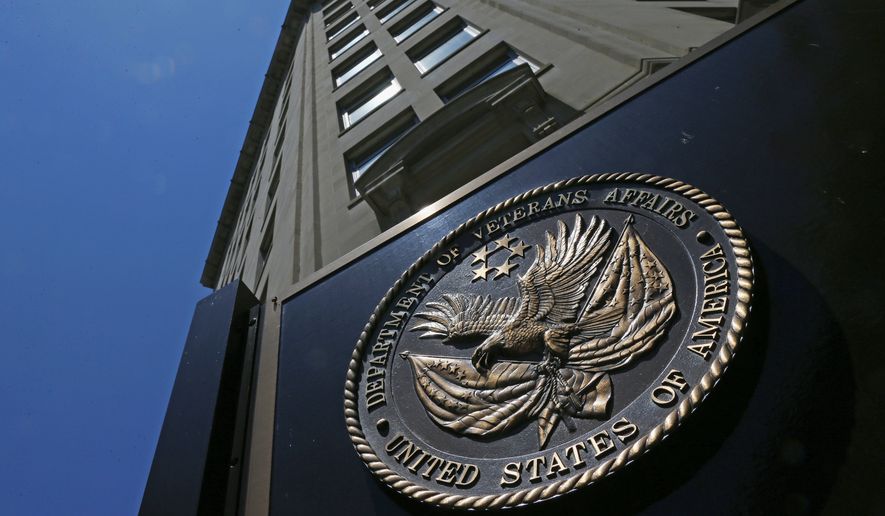In another black mark for the beleaguered Department of Veterans Affairs, a watchdog reported Wednesday that the agency’s Philadelphia office forces thousands of veterans to wait nearly a year for answers on claims, loses their mail and falsifies dates on benefits claims.
The VA’s pension management center in Philadelphia took an average of 312 days to respond to more than 31,000 inquiries from veterans and their families, the report from the VA Inspector General’s office found. The agency is required to respond to such inquiries within five days.
“Inquiries were mismanaged, leaving questions from customers about benefits and services without answers or assistance,” said the report obtained by The Washington Times.
Poor record-keeping in Philadelphia also created duplicate documents that resulted in at least $2.2 million in overpayments to beneficiaries, a mistake that came up in 23 percent of the cases examined by the IG.
There’s also evidence that sloppy handling of documents resulted in veterans’ personal information being exposed. Investigators found “unprotected” documents containing veterans’ personal identity information in an office kitchen accessible to people who don’t work at the VA. The investigators couldn’t determine how long the documents were there.
“Improper storage may have compromised the personal information of some veterans and employees,” the report said.
At least one VA supervisor altered 53 of 87 of quality reviews with the knowledge of office management over a three-month period, rendering the VA’s reported accuracy rates in the processing of claims “unreliable,” according to the report.
“There is an immediate need to improve the operation and management” in the Philadelphia VA office, said the report by acting VA inspector general Richard Griffin.
In its response, the VA said it agrees with 31 of the IG’s 35 recommendations, pointing to new director Diana Rubens who was installed last July but also has come under fire. The VA pointed to increased training, employee meetings and other efforts to improve communication and morale.
The report also highlights miserable working conditions for employees at a VA call center in Philadelphia, part of a warehouse built in 1928 in a high-crime neighborhood at an address that has been used by a registered sex offender. One female VA employee was told to wear “baggy” clothes while working out in the building’s gym because patients from an adjoining rehabilitation facility could be “overly attentive, aggressive, or violent.”
The scathing report about mismanagement in Philadelphia comes as Congress and the IG’s office are investigating the VA’s eye-opening relocation bonus of $288,000 paid last year to Ms. Rubens, the new director of the Philadelphia office who was transferred from Washington to improve service there. The Philadelphia VA handles more than 800,000 veterans in three states.
Investigators are also looking into reports of intimidation of whistleblowers in the Philadelphia VA office, a chronic problem with the agency nationwide.
Sen. Pat Toomey, Pennsylvania Republican, said the problems uncovered at the Philadelphia VA are “outrageous.”
“This report indicates that the Philly VA regional office, one of the largest veterans claims offices in the nation, was altering and hiding documents that resulted in longer waits for veterans’ claims,” Mr. Toomey said. “It highlights the toxic culture of mismanagement within the office, where staff were pressured to alter long-overdue claim dates to stay in compliance and were afraid to come forward to report problems.”
He said policymakers must fix the problem of veterans being denied benefits through “bureaucratic inertia, red tape, and outright deceit.”
“It is also important that those federal employees — paid by the taxpayers — who rigged the system are held accountable,” Mr. Toomey said.
House Veterans Affairs Committee Chairman Jeff Miller, Florida Republican, said the report “is as bleak as it gets, full of systemic malfeasance and deliberate data manipulation.”
“The Philadelphia VA regional office is in crisis, brought on by years of mismanagement and encouraged by VA’s longstanding refusal to hold employees accountable,” Mr. Miller said. “Right now, VA leaders have a choice. They can either fire those responsible for these failures — including those who have now moved on to other positions within the agency — or keep those who caused the problems on the VA payroll, ensuring the substandard service to veterans this report highlights will continue.”
• Dave Boyer can be reached at dboyer@washingtontimes.com.




Please read our comment policy before commenting.